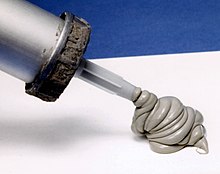Silicone
class of liquid or rubbery, heat-resistant, stable substance consisting of polymers or oligomers of siloxane with other atoms
Silicones (/'sIlIkən/) are polymers that include any inert, synthetic compound made up of repeating units of siloxane. This is a functional group of two silicon atoms and one oxygen atom frequently combined with carbon and/ or hydrogen. They are typically heat-resistant and rubber-like. Silicones are used in sealants, adhesives, lubricants, medicine, cooking utensils, and thermal and electrical insulation. Some common forms include silicone oil, silicone grease, silicone rubber, silicone resin, and silicone caulk.[1] Silicone is also used for cosmetics. Silicone has very little to do with the element silicon (/'sIlIkən/).[2]

References
change- ↑ Hans-Heinrich Moretto, Manfred Schulze, Gebhard Wagner (2005) "Silicones" in Ullmann's Encyclopedia of Industrial Chemistry, Wiley-VCH, Weinheim. doi:10.1002/14356007.a24_057
- ↑ James L. Turley, The Essential Guide to Semiconductors (Upper Saddle River, NJ: Prentice Hall Professional Technical Reference, 2003), p. 4